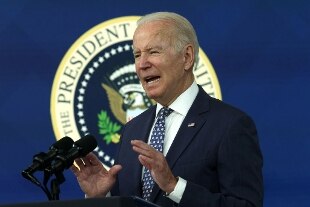Energy, Russia opens the taps and the price of gas falls
China.
Energy is needed, coal use increases
G20.
US advances: more balance in the energy market, minimum tax approval
Lagarde: "Inflation target of 2 percent, it's not time to raise rates"
Cop26, 23 countries undertake to eliminate coal from energy
ECB, EU growth strengthens, high uncertainties remain.
It weighs a lot of energy
ECB, Lagarde: "Strong recovery, but momentum slowed. Inflation rises: it will fall in 2022"
ECB, Lagarde: "Fast recovery to return to pre-crisis levels"
OECD report: inflation leap in the Eurozone
Share
November 23, 2021 - White House steps in to cool the hot fall of energy that threatens U.S. recovery and threatens to bury the hopes of the Biden presidency.
The United States has announced that it will release 50 million barrels of oil from strategic reserves in coordination with China, India, South Korea, Japan and Great Britain, to cool energy prices. After many calls to OPEC + to increase the offer, Joe Biden has decided to go it alone.
Biden was forced to intervene for economic but also political reasons especially after his repeated appeals to OPEC + to increase supply fell on deaf ears.
It is the first time that Washington has coordinated such an action with countries that are the largest oil consumers in the world.
Washington's effort to collaborate with the main Asian economies to lower energy prices is a warning to OPEC + to intervene on crude oil prices that have risen by almost 60% since the beginning of the year.
OPEC + will meet on 2 December to discuss production policy and many are wondering what the response to this operation will be. So far, the decisions taken by Russia, Saudi Arabia and associates have been absolutely cautious after the collapse in prices in 2020 following the pandemic. So far, the organization's countries have increased supply by 400,000 barrels per day (bpd) every month - a pace Washington considers too slow - and there is concern that a resurgence of coronavirus cases could again reduce demand.
The use of strategic oil reserves "is only a buffer measure and very often has the opposite effect, that is to say the rise in prices", Davide Tabarelli, an energy expert, told AGI a few days ago when asked about the subject. "By announcing the recourse to the reserves, the seriousness of the situation is confirmed", he observed.
In fact, the threat of inflation is not only a problem for the economic recovery of the United States and the rest of the world but represents an obstacle for the president in view of the Midterm elections in November 2022. American motorists, analysts explain, "when they go for gas and pay more than $ 3 per gallon if they remember it in the polls. "
At the moment the average is 3.4 dollars which means defeat for the Dems. At the same time, the intervention of the six countries is not giving the expected results because crude oil prices are on the rise with Brent gaining 2.3% to $ 81.5 a barrel after it dropped below $ 79 a barrel in the morning.
Some analysts explain the upside as the release was lower than expected.

